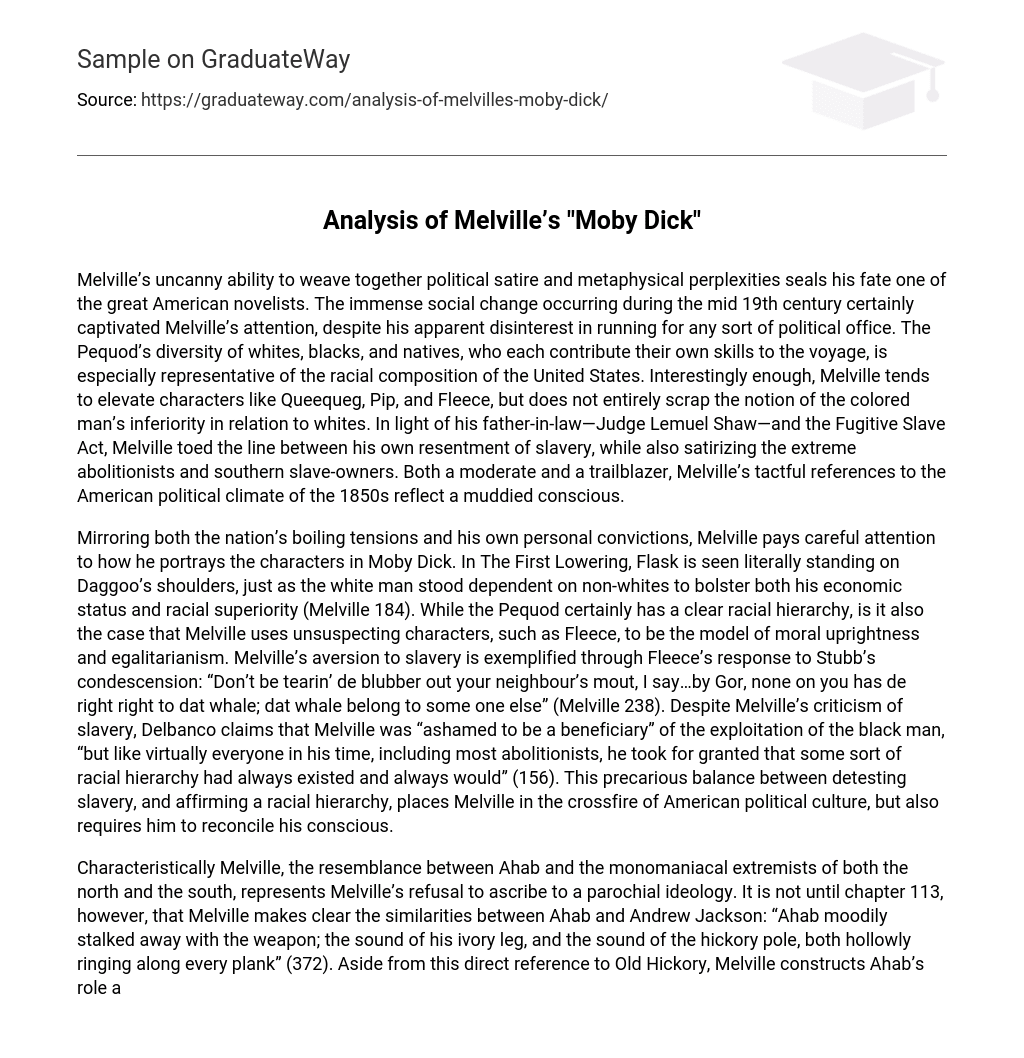Melville’s uncanny ability to weave together political satire and metaphysical perplexities seals his fate one of the great American novelists. The immense social change occurring during the mid 19th century certainly captivated Melville’s attention, despite his apparent disinterest in running for any sort of political office. The Pequod’s diversity of whites, blacks, and natives, who each contribute their own skills to the voyage, is especially representative of the racial composition of the United States. Interestingly enough, Melville tends to elevate characters like Queequeg, Pip, and Fleece, but does not entirely scrap the notion of the colored man’s inferiority in relation to whites. In light of his father-in-law—Judge Lemuel Shaw—and the Fugitive Slave Act, Melville toed the line between his own resentment of slavery, while also satirizing the extreme abolitionists and southern slave-owners. Both a moderate and a trailblazer, Melville’s tactful references to the American political climate of the 1850s reflect a muddied conscious.
Mirroring both the nation’s boiling tensions and his own personal convictions, Melville pays careful attention to how he portrays the characters in Moby Dick. In The First Lowering, Flask is seen literally standing on Daggoo’s shoulders, just as the white man stood dependent on non-whites to bolster both his economic status and racial superiority (Melville 184). While the Pequod certainly has a clear racial hierarchy, is it also the case that Melville uses unsuspecting characters, such as Fleece, to be the model of moral uprightness and egalitarianism. Melville’s aversion to slavery is exemplified through Fleece’s response to Stubb’s condescension: “Don’t be tearin’ de blubber out your neighbour’s mout, I say…by Gor, none on you has de right right to dat whale; dat whale belong to some one else” (Melville 238). Despite Melville’s criticism of slavery, Delbanco claims that Melville was “ashamed to be a beneficiary” of the exploitation of the black man, “but like virtually everyone in his time, including most abolitionists, he took for granted that some sort of racial hierarchy had always existed and always would” (156). This precarious balance between detesting slavery, and affirming a racial hierarchy, places Melville in the crossfire of American political culture, but also requires him to reconcile his conscious.
Characteristically Melville, the resemblance between Ahab and the monomaniacal extremists of both the north and the south, represents Melville’s refusal to ascribe to a parochial ideology. It is not until chapter 113, however, that Melville makes clear the similarities between Ahab and Andrew Jackson: “Ahab moodily stalked away with the weapon; the sound of his ivory leg, and the sound of the hickory pole, both hollowly ringing along every plank” (372). Aside from this direct reference to Old Hickory, Melville constructs Ahab’s role as the captain of the Pequod markedly similar to how Jackson led the United States. In chapter 119, Ahab proclaims to his crew, “All your oaths to hunt the White Whale are as binding as mine; and heart, soul, and body, lungs and life, old Ahab is bound” (Melville 383). The indissoluble attachment amongst southerners to leaders like Jackson and Calhoun, who vowed their commitment to preserve the interests of the south, is reflected by Ahab’s statement. Likewise, the activists of the north—like Garrison—championed a fiery abolitionism that Melville also would not come to embrace
Melville’s distaste for absolutism, as well as Ishmael’s, is perhaps why Melville makes passes at both sides of the national question. Afflicted by his own convictions, Melville is unable to find a rational niche in the rigid political environment of the 1850s. It is precisely his lack of commitment to a specific ideology, as communicated through Moby Dick, that makes Melville quintessentially Melville.





